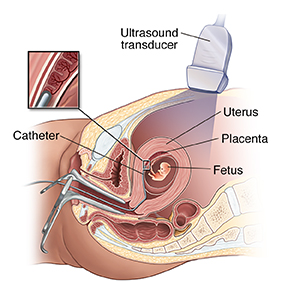CVS (Chorionic Villus Sampling)
CVS is a prenatal test that assesses the genetics of the fetus. The test is most often done after 10 weeks of pregnancy. Discuss with your healthcare provider whether CVS is right for you.
Should you have CVS?
CVS is a diagnostic prenatal test that can find out if a fetus has chromosome or gene problems. These problems may cause conditions, such as Down syndrome, Edward syndrome, sickle cell disease, cystic fibrosis, and Tay-Sachs disease. CVS does not diagnose heart disease or spina bifida. The following risk factors can increase chances of fetal gene problems:
How CVS is done
CVS is an invasive test. It is done by a healthcare provider with special training. The test can be done through your belly (transabdominal). Or it may be done through your cervix (transcervical). It's common to feel some cramping during and after the CVS test.
Transabdominal CVS
-
The healthcare provider puts a needle through your belly (abdomen) and into the uterus.
-
The healthcare provider uses ultrasound to guide the needle into the placenta. Ultrasound uses sound waves to make an image on a screen.
-
The healthcare provider takes a small amount of tissue from the placenta with a syringe.
Transcervical CVS
-
First, the fetus is located with ultrasound.
-
The healthcare provider puts a thin tube into your vagina and guides it to your uterus.
-
The healthcare provider removes a small amount of cells from the tissue that will become the placenta (chorionic villi) by gentle suction.
You can go home right after the test. But you may need to take it easy for a day or so.

When to call your healthcare provider
There is a small risk of miscarriage after CVS. Call your healthcare provider right away if you notice:
Getting test results
You’ll learn your CVS results about 1 to 2 weeks after the test. CVS is a very accurate test, but in a few cases, results may be inconclusive. Most results are normal. Even if yours aren’t, it doesn’t always mean there’s a problem. You and your healthcare provider can talk about other tests or special care you may want.